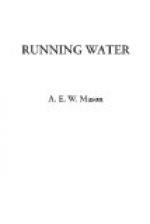“My father,” said Sylvia, in relief. Her clasp upon Chayne’s arm relaxed; her terror passed from her. In the revulsion of her feelings she laughed quietly at her past fear. Chayne looked quickly and curiously at her. Then as quickly he looked again to the window. Both men in the room were now lit up by the yellow light; their attitudes, their figures were very clear but small, like marionettes upon the stage of some tiny theater. Chayne watched them with no less suspense now that he knew who the intruder was. Unlike Sylvia he had betrayed no surprise when he had seen Garratt Skinner’s head and shoulders rise into view behind Walter Hine; and unlike Sylvia, he did not relax his vigilance. Suddenly Garratt Skinner stepped forward, very quickly, very silently. With one step he was close behind his friend; and then just as he was about to move again—it seemed to Sylvia that he was raising his arm, perhaps to touch his friend upon the shoulder—Chayne whistled—whistled sharply, shrilly and with a kind of urgency which Sylvia did not understand.
Walter Hine leaned forward out of the window. That was quite natural. But on the other hand Garratt Skinner did nothing of the kind. To Sylvia’s surprise he stepped back, and almost out of sight. Very likely he thought that he was out of sight. But to the watchers in the road his head was just visible. He was peering over Walter Hine’s shoulder.
Again Chayne whistled and, not content with whistling, he cried out in a feigned bucolic accent:
“I see you.”
At once Garratt Skinner’s head disappeared altogether.
Walter Hine peered down into the darkness whence the whistle came, curving his hands above his forehead to shut out the light behind him; and behind him once more the shadow appeared upon the ceiling and the wall. A third time Chayne whistled; and Walter Hine cried out:
“What is it?”
And behind him the shadow vanished from the ceiling and the door began to close, softly and stealthily, just as softly and stealthily as it had been opened.
Again, Hine cried out:
“Who’s there? What is it?”
And Chayne laughed aloud derisively, as though he were some yokel practising a joke. Hine turned back into the room. The room was empty, but the door was unlatched. He disappeared from the window, and the watchers below saw the door slammed to, heard the sound of the slamming and then another sound, the sound of a key turning in the lock.
It seemed almost that Chayne had been listening for that sound. For he turned at once to Sylvia.
“We puzzled them fairly, didn’t we?” he said, with a smile. But the smile somehow seemed hardly real, and his face was very white.
“It’s the moonlight,” he explained. “Come!”
They walked quietly through the silent village where the thick eaves of the cottages threw their black shadows on the white moonlit road, past the mill and the running water, to a gate which opened on the down. They unlatched the gate noiselessly and climbed the bare slope of grass. Half way up Chayne turned and looked down upon the house. There was no longer any light in any window. He turned to Sylvia and slipped his arm through hers.




